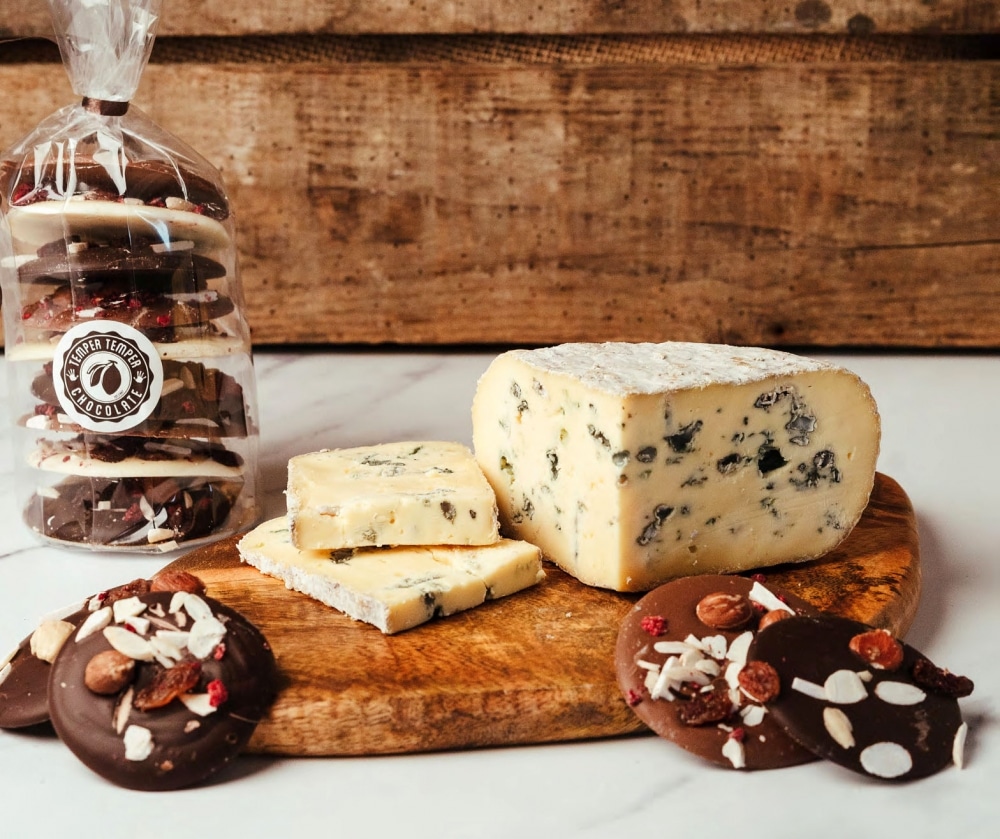For centuries it has been predominantly the French and Italians who have been revered for their cheesemaking prowess, but over the past few decades the UK has started to impress with its diverse dairy offerings, too.
Obviously the likes of Cheddar and Stilton have been around for hundreds of years, but it’s fair to say we are also seeing a steep rise in the number of artisan cheesemakers dotted around the British isles.
Frank Reynolds
One such person is Frank Reynolds, who is part of the Kingcott Dairy dynasty operating out of their picturesque dwelling in Staplehurst.
“Dairy farming is all I can remember wanting to do!” Frank explains. “Growing up here in Staplehurst meant I was always around cows and tractors, and it is fantastic to be able to do a job I enjoy.”
Frank’s father, Steve, started dairy farming in 1990, but the family’s roots in rearing and milking cattle can actually be traced back 400 years.
“We have now grown to over 300 acres and we farm using only low-impact, sustainable and regenerative practices,” Frank adds.
The herd is grazed in the fields most of the year and clover is regularly planted to aid carbon capture.
“Healthy, happy cows are of the highest priority for Kingcott Dairy”
Healthy, happy cows are also of the highest priority, says Frank, and he and dad Steve and brother Archie care for a small herd of Danish Red cows, which produce a high-protein milk, perfect for cheesemaking.
“I’m proud that as a dairy farm we are following more sustainable farming methods to help lower our impact on the environment.
“We’ve definitely made a start by choosing to have a smaller amount of cows on our land and to farm in a way that means they go out and graze and enjoy the fields and pastures for a large part of the year.”
So what made Frank’s dad decide to start making cheese in the first place?
“The historically low returns to the dairy farmer for their milk meant that my father had to diversify to survive as a small dairy farm. We began making cheese in 2010 and have loved seeing the increased interest in local produce and its provenance.”
The family firm started off with Kentish Blue, which has now become Kingcott’s signature cheese.
“We wanted a local blue cheese which was a bit different to the usual Stilton varieties”
“We wanted a local blue cheese which was a bit different to the usual Stilton varieties,” reveals Frank.
He adds that the farm launched their second cheese, Kingcott Blue, three years ago with a specific aim in mind.
“The idea was to offer a softer textured blue cheese with smooth flavours, hoping to appeal to people of my age (20-30) who seem to enjoy creamier, less stronger cheese varieties.
“Having worked out what I wanted to make I then had to find the best way of making it. Because the moisture content is higher, it’s much more difficult to achieve the blue veining. We use a natural mould, the cheese is made entirely by hand and then left to mature for six weeks,” says Frank.
The cheese has received industry recognition with two stars at the 2021 Great Taste Awards and a Gold Award at the prestigious International Cheese & Dairy Awards.
Both Kingcott Blue and Kentish Blue are made on the Kingcott farm using unpasteurised milk straight from the cows, having travelled only ten metres to the cheesemaking room.
Is one variety more popular than the other I wonder?
“Both are selling really well!” smiles Frank. “Kentish Blue is quite well known within the South East and has been around for 12 years. But the Kingcott is definitely gaining popularity in pubs and restaurants, especially during the warmer months!”
The family trades out of a few farmers’ markets including Penshurst, which takes place on the first Saturday of each month. They are also stocked in Groombridge Farm Shop in Eridge, Oliver Greens on The Pantiles and Fuller’s Farm Shop in Bunny Lane.
“We’re also stocked in lots of independent food shops all over the county and can courier orders via our online shop, which we set up ten years ago.
“We use DHL overnight couriers to make sure our cheese arrives in peak condition – wherever it’s going in the country.”
What in Frank’s eyes makes up the perfect cheeseboard?
“With over 700 varieties of British cheese there is a huge range produced here, and as a farmer I would always prefer to buy British. I like to have three or four varieties on a cheeseboard, but I do like to vary them throughout the year and prefer to buy cheese from smaller local dairies.”
And although Kingcott have diversified they still sell milk on, which is the surplus they don’t use in cheesemaking.
“It goes to a dairy processor who collects it from our farm, then pasteurises and bottles it ready for sale.
“It means that we can concentrate on looking after the cows and making cheese!” Frank laughs.
“Our cheese is all handmade, meaning minimal electricity is needed, and hopefully we can start to generate some energy of our own in the near future,” he concludes.
With Kingcott’s cheese chosen as the Taste of Kent Awards’ overall food product of the year for 2020, and boasting numerous accolades from prestigious specialists such as The Great Taste Awards and International Cheese & Dairy Awards, it’s easy to see why Kingcott Dairy has now established its place as one of the finest cheese producers with two stellar varieties to come out of Kent in recent times.








